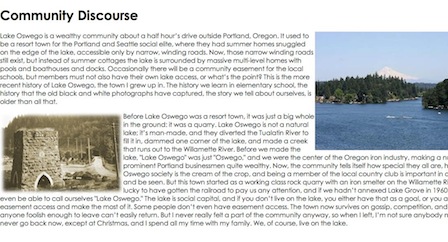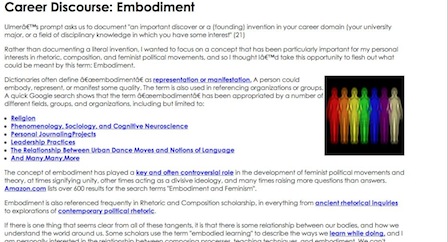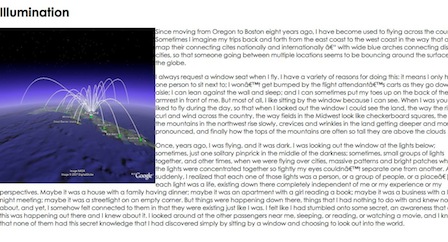Our [Electrate] Stories
Explicating Ulmer's Mystory Genre
Marc C. Santos, Ella R. Bieze, Lauren E. Cagle, Jason C., Zachary P. Dixon, Kristen N. Gay, Sarah Beth Hopton, Megan M. McIntyre
Reflection: Ella R. Bieze
1. What work does a mystory do?
Although we can probably read a lot into what a mystory could do, I think the work that a mystory actually does is allow the person creating the mystory to reflect, remember, and refract the different experiences, interactions, dreams, and moments that have shaped them into the person they are at the time they create their mystory. In this way, the work of the mystory is personal and, I would argue, inherently intimate. The mystory has the potential to be dangerously personal if the person creating the mystory decides to approach it in that way: creating the mystory with the goal of publishing it, for example, will probably result in different rhetorical choices and varying degrees of personal reflection than creating a mystory that will never be read by anyone but its creator. This danger then comes from what we are willing to admit to ourselves, and how honestly we are willing to replay stories and experiences from our past. It is easy to censor ourselves for others, but if we create the mystory for our eyes only, that choice gives us an opportunity to dig into the raw wounds we've let scab over as time has passed. I suppose the danger might also come from deciding, in the end, to publish a mystory that was not originally created with that in mind. I think we all have stories we tell ourselves about how we got to be the way(s) we are today; digging deeply into personal memories, painful experiences, half-remembered dreams can shift, shake, and shatter that foundation. The potential danger here lies in the possibility that we are not (coming from) where / who we thought we were. This can be frightening, but I also think that this makes the mystory worth doing multiple times as we get older and remember more / fewer / different things. The work of the mystory is to force us to reconsider who we believe we are and where we believe we came from.
2. Does the mystory realize Gregory L. Ulmer’s aspirations?
In constructing the mystory, we may come away from it with the same notions of our own subjectivity as we had before we attempted the mystory, but I think it is clear from the reflections in this article that for many of us, something has changed, or become clearer, or become more complicated; our notions of our own subjectivity have shifted, and that shift is the work of the mystory.
3. Can/should you learn Ulmer while learning HTML and CSS?
These are two different questions (can/should), and I think the answer(s) depend(s) on a few things: (1) the context in which the project is approached; (2) the goals of the person approaching the project; (3) the thoroughness with which the person approaching the project plans to work on each side of it (Ulmer versus learning HTML and CSS).
For this class, a graduate seminar on New Media Production, the answer is “yes, you can learn Ulmer while learning HTML and CSS.” This is a workshop class full of graduate students who are expecting to both learn HTML/CSS and who are used to exploring dense theoretical material; the course is the context, and the goals for these graduate students is to succeed in both of those tasks. The tricky part, then, is how thoroughly each side of the project should be approached; what I am thinking about here, in particular, is the intimate nature of Ulmer’s mystory project. The graduate student in this situation must decide how deeply he or she will delve into the reflective, jarring, frustrating, exhausting mental exercises Ulmer asks of those creating mystories. But again, because of the context, we can reasonably expect graduate students to be able to balance learning new skills, exploring complex theory, and negotiating the personal aspects of this project.
This is where there is a difference between can and should, and I also want to differentiate between learning Ulmer’s mystory project and doing Ulmer’s mystory project. If the work of the mystory is, as I say above, to gently force the person creating the mystory to delve into their understanding of the origins of their own subjectivity, then you can learn the mystory while learning HTML and CSS, but I don’t believe you can’t really, thoughtfully, thoroughly, do the mystory while learning HTML and CSS because your full focus must be, needs to be, yourself. The answer to this question, then, really depends on that third caveat I list above. If someone wants to really do the mystory, thoroughly, that should be the focus, not that in addition to HTML and CSS. I think the tendency in a graduate course like this one is to gain the practical skills that will help us become more marketable or approach new projects or gain useful experience; because of that, it may be easy to dive into the HTML and CSS work and just skim the surface of the mystory exercises. Technically, in doing so, you are learning both Ulmer and HTML/CSS, but I don’t think you are really doing the mystory.
So, the answer to this question, like everything involving Ulmer’s mystory, is personal. Can I learn Ulmer while learning HTML/CSS? Yes. Should I do the mystory while learning HTML/CSS? No.
4. Should a mystory be public or private?
Again, I think the answer to this question will be drastically different depending on how someone chose to approach creating the mystory. I maintain that the mystory is an intensely personal journey, and because of the way I approached the mystory project, I chose to keep mine private. I also chose not to share any of my writings verbally in class. I initially decided to make my mystory private so that I could really devote to the project the emotional digging that I felt the exercises called for. Once I committed to (re)discovering those very personal experiences, I chose to keep my mystory private mostly for self-preservation, which I mean in two ways: (1) the writing I did for the mystory exercises is informal; it’s messy; it was not really revised—it is not the caliber of writing I would want to share publicly at this time. Even intensely personal writing that has been published has been reviewed, revised, reworked, and I would want to go back and do those things before making these writings public, if I chose to do so. And (2) By keeping my mystory private, I was able to control who had access to this vulnerable side of me; if I had made it public, not only would all of my classmates have had access to those stories, but anyone else who happened to stumble upon my website would also have had access to that side of me. I did not want either of those things to happen.
That being said, this is a personal decision. I can easily see the mystory being either public or private, and I recognize the value and importance of sharing personal stories publicly. I like the idea of combining the personal with the academic, and I can see an important aspect of our academic personas should be vulnerability; sharing that vulnerability has the potential to open up spaces for some incredible work to be done for academe, students, and the society we find ourselves in today. In feminist theory, that sharing, that discourse, that emphasis on the personal as public/political, is an important aspect to the feminist political movement, and for me, personally, it’s an important part of how and why and in what direction I’ve pursued this particular career path. But there’s a certain violence in forcing someone to share publicly what they would rather keep private, and because of that I’m not willing to say whether the mystory should be public or private, only that it could be either, and it is up to the person creating it to decide which is right for him or her.
5. Did you experience an aha moment during your mystory process?
Like Kristen N. Gay, my aha moment came with the creation of my Wide Emblem. Throughout the process of creating my mystory, I kept returning to the same theme of family, but I didn't really realize that's what I was doing until I needed to "design an emblem that evokes the look and feel of [my] mystory" (Ulmer, 2003, p. 246). I reflected on the stories I had dug up and retold over the course of creating my mystory, and I realized that even as my stories focused on me and moments I had personally experienced, these stories always referenced my family in some way. Even for assignments in which I didn't include explicit references to family, like my Illumination, in rereading them I saw that my family still had a presence there: the moment I describe in my Illumination takes place as I am flying between Boston, where I was living at the time, and Oregon, where my family lives. So I suppose the creation of my Wide Emblem was my aha moment in that I realized that in creating my mystory, my family is what I had been circling around the entire time, and what I will probably continue to circle around for the rest of my life. They are where I started, and where I will always have my center. This, I think, is also why I have so insisted on the intimate nature of the mystory, and resisted making my mystory public: I am not the only one in it.
6. What particular part of your mystory is your favorite (and why)?
I wouldn't say that I have a favorite part of my mystory, but I can talk about my favorite aspect of Ulmer's project. My favorite part of Ulmer's project is how much he embraces and encourages the kind of writing that as grad students, we rarely have the opportunity to practice. I think this is something a few of us have touched on in these reflections, or at least in our discussions in class and outside of it. It was a kind of playing with words and fragments and feelings, rather than a logical connection of evidence-based claims. It was hard, and it was scary, and it wasn't always that pleasant, but it was different, and that was a good thing. Creating this project forced me to think, write, organize, design, and imagine in ways that I'd never done before; even though I resisted at times, in the end, that strangeness was, I think, my favorite part of the whole project.
7. What else do you want to say?
The more distance I get from my mystory, the more I want to return to Ulmer's project and do it again, and this time do it publicly. As challenging as I found the process of creating my own mystory, and although I ultimately chose to keep mine private, I really believe it's something worth doing multiple times, both for those creating their own mystories and for those reading / seeing / feeling others' mystories. That being said, it is not an easy project. The tasks are often confusing, strange, and, vague. They rely more on feelings, images, notions, and themes than on concrete questions with right or wrong answers. In creating my mystory, I was often left thinking about the assignments for a long time before coming up with ways to answer them, and I had to decide between the multiple answers I came up with, or combine them, or pick and choose pieces from them. Really, I hesitate to call those things I created answers to questions—they seem to have been more like responses to calls. Creating a mystory can thus be difficult, but I think that if we thoughtfully and creatively consider Ulmer's calls and the responses we give to them, approaching both Ulmer's project and our own projects with an open mind, there is an opportunity here to drastically shift the ways we think, the ways we create knowledge, and what, exactly, those knowledges look and feel like. Creating a mystory is not the same as simply coding a webpage, writing a narrative, or even designing an image: it is a multilayered, ebbing, flowing, interactive, subjective punctum. And ultimately, even though it's strange, new, and different, it's incredibly exciting in its strangeness, newness, and difference. And although I struggled with it at times, I think, in the end, I like that it was a bit of a struggle.


